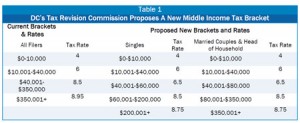A new DCFPI report released last week found that the gap between high and low wages in DC is the biggest it’s been in more than three decades. This is largely because DC’s economy doesn’t work like it used to for residents without a college degree. The Mayor and DC Council, however, have an opportunity in the fiscal year 2015 budget to help close this opportunity gap by making key investments next year in areas like job training, literacy, affordable housing and assistance for families with children.
Today’s District Dime focuses on ways to close the gap by making targeted income tax reductions that can help take the first steps needed to re-balance DC’s tax system. Currently, DC’s middle income residents pay a larger share of their income in combined property, sales and income taxes than all other residents, as well as face higher marginal tax rates when compared to people of similar income levels in other states. In its recommendations presented last month to the DC Council, the Tax Revision Commission offered a package of income tax changes to address this imbalance.
DCFPI strongly supports these changes, with two modifications. These changes include:
- A lower middle-income tax bracket. A new 6.5 percent tax rate for singles with taxable incomes between $40,000 to $60,000 and for married filers between $40,000 to $80,000 would be added (See Table 1). The new bracket and rate means that filers just above $40,000 would no longer pay the same 8.5 percent rate as singles making $240,000.

- Maintaining a top tax rate. The commission also recommended keeping a top tax rate for higher-income residents, but putting it at 8.75 percent. DCFPI agrees that it is important to maintain a top rate to help ensure more equity in DC’s tax system and prefers to keep the rate at its current 8.95 percent rate. This would not result in a significant difference in taxes to top earners, but it would help offset revenue losses from reducing tax rates on middle-income earners and do more to make the overall system more equitable.
- Increasing the personal exemption and standard deduction. The commission recommended raising DC’s personal exemption and standard deduction to the federal levels. By doing so, DC would exempt most working poor families from owing DC income tax and help tax credits, such as the Earned Income Tax Credit (EITC), go further in making work pay. DC currently has one of the most generous state EITC benefits in the country, but because exemptions are so low, the credit is ineffective at providing significant relief. The commission also recommends allowing the personal exemption to phase-out for higher income earners, similar to the federal personal exemption. This helps pay for middle-income tax relief and adds even more fairness to the system.
- Expanding the EITC for childless adults. The EITC provides substantial tax relief for low-income workers and helps make work pay for thousands of District families. However, the credit currently provides very little help to workers without children. The commission proposed to expand the credit for childless workers which would help provide more tax relief to a substantial number of low-wage workers. For example, a childless worker employed 30 hours per week at $11.50 an hour would qualify for an EITC of $450 and end up owing $50 — a 90 percent reduction in taxes. By doing this, DC would be the first state to create an EITC for childless adults that goes beyond the federal credit — continuing its national leadership in making work pay.
While DCFPI supports the tax commission recommendation that DC mirror the federal tax filing categories for households, we remain concerned that some lower-income households might now might face a marriage penalty. A marriage penalty is when a couple faces a high tax rate when they have to file together as opposed to if each person filed as single. Under the commission’s recommendations, DC would eliminate it’s prior way to address the marriage penalty, by allowing for married couples to file taxes separately, even if they had filed together on a federal return. We support this change because DC’s current system created confusion and inefficiencies.
The tax commission’s recommended brackets, especially the new middle bracket, only partially address the fact that some married couples face higher tax rates than in if they filed separately. DCFPI recommends a slightly different bracket structures that all but eliminate the issue (See Table 2). DCFPI’s proposal would relieve the marriage penalty at lower incomes and takes into account the needs of singles with children (head of households). 
Stay tuned to the District’s Dime for other ways the Mayor and Council can close the gap in the FY 2015 budget. And don’t forget to join us this Thursday for a free screening of the film Inequality for All and to talk about ways to close the gap in DC.
To print a copy of today’s blog, click here.
